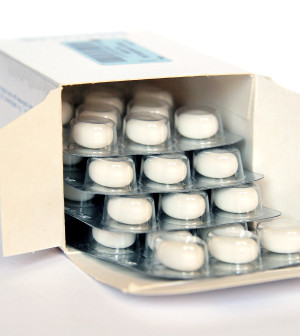- Could Your Grocery Store Meat Be Causing Recurring UTIs?
- Are You Making This Expensive Thermostat Error This Winter?
- Recognizing the Signs of Hypothyroidism
- 10 Strategies to Overcome Insomnia
- Could Artificial Sweeteners Be Aging the Brain Faster?
- Techniques for Soothing Your Nervous System
- Does the Water in Your House Smell Funny? Here’s Why
- Can a Daily Dose of Apple Cider Vinegar Actually Aid Weight Loss?
- 6 Health Beverages That Can Actually Spike Your Blood Sugar
- Treatment Options for Social Anxiety Disorder
‘Prehabilitation’ Before Colon Cancer Surgery May Aid Recovery


Exercising, eating a healthy diet and learning relaxation techniques before colorectal cancer surgery appeared to speed a patient’s recovery, a small study found.
The study included 38 patients who took part in a “prehabilitation” program and 39 who only did normal rehabilitation after their surgery.
The prehabilitation program lasted an average of about 24 days and included: 50 minutes of aerobic and resistance exercises at least three days a week; a personalized nutrition program and whey protein supplementation, and lessons in relaxation methods to help reduce anxiety.
After surgery, both groups of patients followed the same rehabilitation program.
At the start of the study, people in both groups walked about the same distance in six minutes — approximately 425 meters. (One meter is equivalent to about 3.3 feet.) But immediately before and two months after surgery, patients in the prehabilitation group could walk significantly farther than those in the other group, according to the study in the November issue of the journal Anesthesiology.
Just before surgery, the patients in the prehabilitation group walked an average of 25 meters more in six minutes, compared with 16 meters less for patients in the other group. Two months after surgery, the average distances were about 23 meters more in six minutes than at the start of the study for the prehabilitation group and 22 meters less for the group that had no intervention, according to the researchers.
“Prehabilitation prepares patients to withstand the stress of surgery so they are able to recover faster and function better after the procedure,” lead author Dr. Francesco Carli, professor of anesthesia at McGill University Health Center in Montreal, said in a journal news release.
“Pre-surgery conditioning helps patients take an active role in their own recovery. We believe instituting prehabilitation before surgery when possible could improve health and recovery and reduce costs,” he added.
Surgery is the primary treatment for colorectal cancer, the third most common type of cancer in the United States, the researchers noted.
“Even when there are no complications, colorectal cancer surgery patients suffer from a 20 to 40 percent reduction in functional capacity after surgery,” Carli said.
“That’s especially true for elderly patients with other health conditions, who may not recover to the function levels they were at before surgery for several months, if at all. Getting these patients healthier before surgery would be of huge benefit,” he said.
More information
The American Cancer Society has more about colorectal cancer.
Source: HealthDay
Copyright © 2026 HealthDay. All rights reserved.










